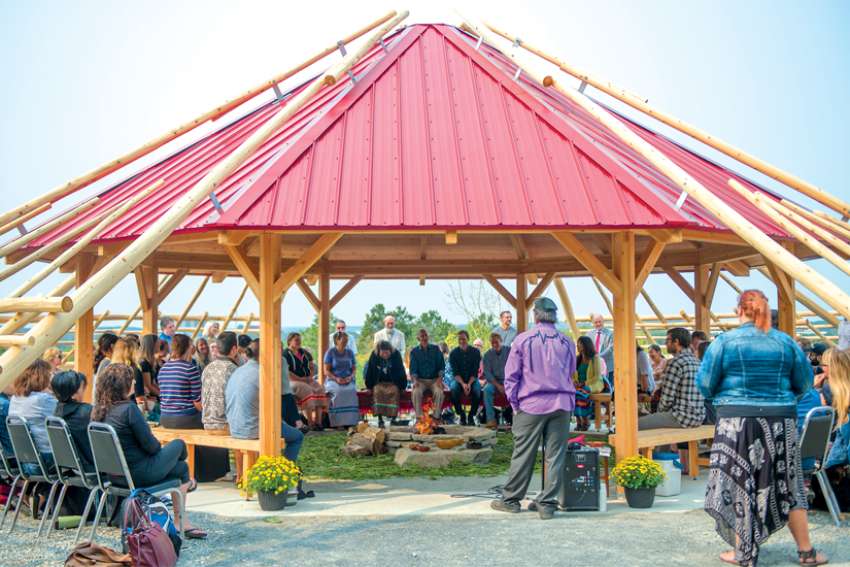It was 1975 and elders such as Dr. Jim Dumont and Dr. Edna Manitowabi and their allies helped set in motion a program that would empower Indigenous and bring the ways of their people back to them after residential schools tried to take that away, said Tasha Beeds.
“That early revitalization in the (19)60s and ’70s when they were bringing our own ways of being back to our people, reminding us of where we came from. That’s what that program did in Sudbury 45 years ago,” said Beeds, a Plains Cree woman from Treaty Six lands in central Saskatchewan who is now an associate professor in the university’s Indigenous Studies department.
What those who initiated the program let Indigenous people know is that they weren’t the “savage” from some “uncivilized” culture.
“They reminded us, you aren’t what they say we are. You aren’t a savage. You aren’t uncivilized. You have this rich, beautiful, intellectual, spiritual, powerful bundle and it’s inside the land, it’s inside the waters and it’s inside you,” said Beeds.
All this the department has allowed Indigenous to tap into, and “that’s what we’re continuing to carry forward,” she said.
Understanding the imprint of Indigenous people on Canada — the culture and the language, and the history that has been both proud and scarred — has been a cornerstone of many university programs across Canada, and in Sudbury longer than most.
The program’s 45 years were celebrated March 5-7 at the northern Ontario university federated with Laurentian University. Anishinaabe Maanjidown: The Continued Spirit of Indigenous Studies celebrated the growing discipline of Indigenous Studies and some of the key people at its forefront, and in turn the forefront of the collective Indigenous revitalization and resurgence movement.
The bilingual, tri-cultural (English, French and Indigenous) University of Sudbury is based in the tradition of the Jesuit Fathers who founded the university in 1913 as College du Sacré-Coeur (it changed to its current name in 1957). The university’s Indigenous Studies program was among the first in Canada — along with Trent University in Peterborough, Ont. — that has allowed Indigenous people to show they have something to offer.
“It’s a very powerful knowledge system and you have to be rooted in it,” said Beeds. “That’s what our early elders and knowledge keepers were trying to explain. You have to live this type of knowledge in order to teach it. We have degrees within our own societies.”
Beeds said Dumont was all about asserting that Indigenous society had an equivalency with non-Indigenous society, despite the oppression Indigenous people were facing, including the residential school system.
“They were trying to find a way to show people that our knowledge systems were not destroyed despite all the efforts (to destroy it),” she said. “Our very knowing is inherent in our ceremonies, in the way the teaching is given to us by our ancestors.”
And it was with non-Indigenous allies like United Church minister Dr. Ed Newbery, who with his wife Dr. Andrina Newbery was instrumental in founding the department (which he would head). He invited Indigenous elders to the university, believing that Indigenous should control their own education, said Beeds. It was this vision that helped Indigenous Studies expand across the nation where there’s now some sort of programming in virtually every Canadian university. There’s also been the establishment of Indigenous institutions like First Nations University at the University of Regina, Shingwauk Kinoomaage Gamig (which offers an Ojibway language BA) at Algoma University and the Seven Generations Education Institute in Fort Frances and Kenora, Ont., and more.
“That’s what we want. We want our own universities,” said Beeds.
Anishinaabe Maanjidown recognized those who have stood up for Indigenous education and laid the foundation for how far it has come over the past four-plus decades. These people wanted Indigenous following them to learn so that they could help their people.
“They were able to carve out these spaces for us to be who we truly are as Anishinaabe, as Indigenous people,” she said.
Today society is seeing the impact of Indigenous taking charge of their educational future. “Having control of that education, even within the context of departments inside of institutions, it’s been life-changing for many of us,” she said, with Indigenous people taking leading roles as lawyers, doctors, politicians, professors and more.
Beeds sees this as only the beginning and dreams of seeing the department become an institution of its own serving the north. And she’d like to see it sooner rather than later. In the meantime, those who set this in motion need to be recognized.
“These ones that laid those paths for us to get to this point, they’re in their 70s and 80s, some have passed on. We need to stop for a second and look back at where we’ve come from.”


